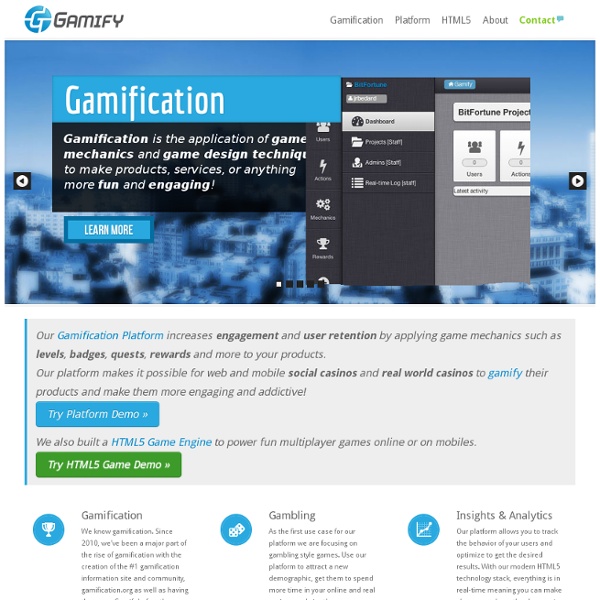



Gamification: Insights And Emerging Trends Editor’s note: Tim Chang is a managing director at Mayfield Fund. Follow Tim on Twitter @timechange. He’s hosting a workshop on gamification at the Mayfield Fund offices on June 6 and has reserved 10 spots for TechCrunch readers — more details at the end of this post. I have been active in the field of gamification for the past couple of years, working with companies like Badgeville, HealthTap, Gigya, Basis and others on leveraging game mechanics for end user behavior measurement, scoring and shaping. Last week, I participated on an investor panel of at VatorSplash’s Gamification Summit and the group shared several noteworthy points:
Five Essential Steps for Gamifying Education Whether you are considering gamifying a single lesson, an entire curriculum, or a whole school, it can be a daunting and confusing process. Those who try their hand at integrating game mechanics into the classroom setting may meet with less than stellar results and give up after just one attempt. But effective gamification is a complex undertaking that requires both the motivation to work harder at making learning engaging for students and the dedication to experience, accept, and learn from failures when doing so. I have spent the past year gamifying my college-level composition courses and, while I am still by no means an expert at gamifying education, I have, in the process, learned a few things from my own failures. In reviewing these lessons while preparing the next iterations of two of my classes, I realized that they can be categorized into five distinct processes that will make the task of gamifying learning less daunting and will lead to more effective results. 1.
The Future of Gamification Introduction and overview of responses The word “gamification” has emerged in recent years as a way to describe interactive online design that plays on people’s competitive instincts and often incorporates the use of rewards to drive action—these include virtual rewards such as points, payments, badges, discounts, and “free” gifts; and status indicators such as friend counts, retweets, leader boards, achievement data, progress bars, and the ability to “level up.” While some people dismiss gamification as a fad, neuroscientists are discovering more and more about the ways in which humans react to such interactive design elements.
Will Wright on Gamifying the World: From SimCity to the Future Will Wright Shares His Experience on Gamifying Systems and Simulations One of the most phenomenal experiences of GSummit SF 2013 happened with Will Wright’s keynote talk. As the creator of SimCity and countless other games and simulations, Wright’s talk goes deeply into games’ and their effect on us as humans in society and what that means for gamification in the grand scheme of things. He touches on the lessons can we take from games — and decades of experience designing for fun — to create engagement for large audiences with complex models and issues? How can we make simple everyday interactions more compelling and use them as teachable moments to energize society?
From Gamification to Intelligence Amplification to The Singularity “Moore’s law became obsolete as far as graphics were concerned. Moore’s law was doubling. It was accelerating so fast that NVida started calling it Moore’s law cubed.” Playing games for employment: Defining the mission Young people dig into the problems they face when looking for jobs. Photo: Emerson College In one of our previous blog posts, we showed why we want to tackle the problem of youth unemployment in Moldova by playing games. We want to share some of our first steps of defining the game – together with our partners from Emerson College and the National Youth Council of Moldova. Step 1: Meet CommunityPlanIt For the purpose of our project, we decided to adapt the CommunityPlanIt platform, successfully run by Emerson College in the US.
Gamification About the Course Gamification is the application of digital game design techniques to non-game contexts, such as business, education, and social impact challenges. Video games are the dominant entertainment form of modern times because they powerfully motivate behavior.
Gamification increases engagement and retention levels Gamification is on the rise and has become one of business’ recent buzzwords. But what are we talking about? Defined as the use of game design mechanisms in non-gaming contexts, the term gamification was first introduced in 2002 by computer programmer Nick Pelling. The Gamification of Life On last week’s edition of Spark, my new favorite podcast, the topic was games and the first segment was a very interesting discussion with Jesse Schell, a game designer who also teaches at the Entertainment Technology Center at Carnegie Mellon University. His thesis is that, while games of one kind or another have always been with us, the ability to store and access huge quantities of data in the 21st century is bringing about the “gamification” of life. The whole discussion is worth listening to (an extended version is also on the show site) but there were two pieces that stood out for me. First, is Schell’s view of school as gaming. People are already talking about how to reorganize [using gaming techniques] school because school is already a kind of a game. You go they have tasks, you do the tasks, you get a score.